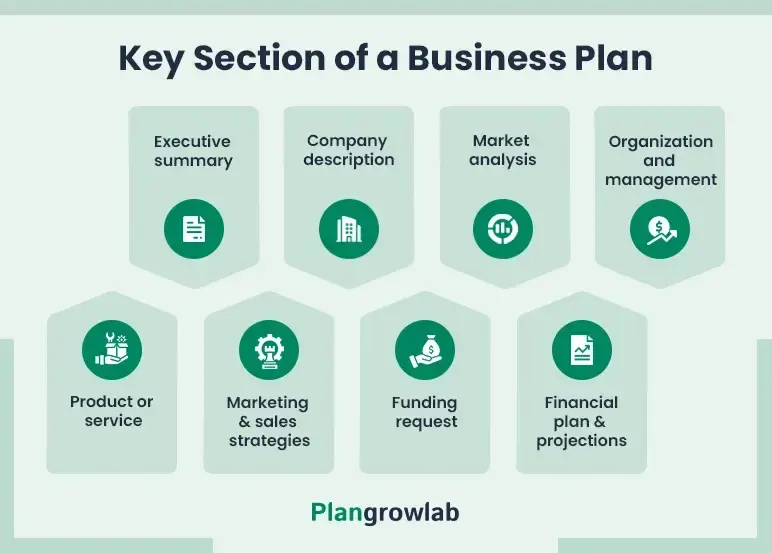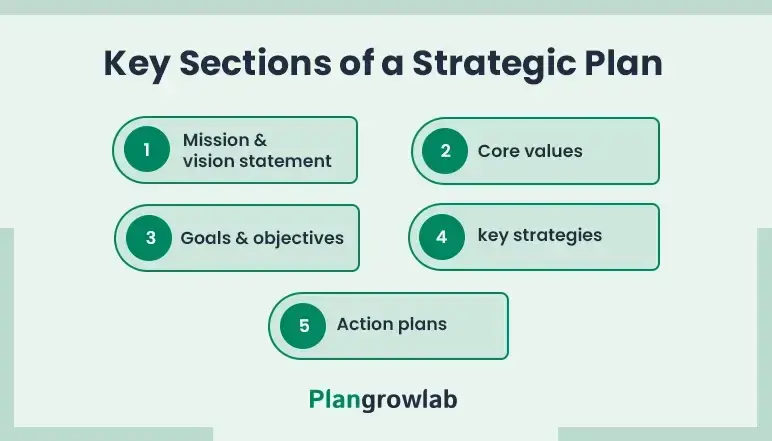Starting a business is exciting, but it comes with a lot of planning. You might have heard you need a business plan. Then someone mentions a strategic plan, and you wonder—aren’t they the same thing? It’s easy to get these two important plans confused.
In reality, a business plan and a strategic plan serve different purposes for your business. Both are crucial, but they are not interchangeable.
In this post, we’ll break down business plan vs strategic plan. Moreover, we will explore what each plan is, how they differ, when you should use each, and why having both will set your business up for success.
By the end, you’ll know exactly when to grab your business plan versus when to whip up a strategic plan
Let’s get started.
What is a business plan?
A business plan is like a detailed road map you create when you start a business or when you want to expand one. It covers what your business is about, what you’ll sell, who you’ll sell to, how you’ll make money, and how much money you’ll need to get it off the ground.
It’s something you’ll usually write when you’re:
- Starting a new business
- Looking for investors or loans
- Planning to grow your business
Remember, entrepreneurs with a business plan are 260% more likely to launch their business compared to those without one. Hence, it isn’t something you just write and forget. It’s a tool for long-term planning, usually covering the next 3 to 5 years.
Key things you need to know about a business plan:
| When to create a business plan? |
|
| Why is it important? |
|
| Business plans are prepared for |
|
| Tools to prepare a business plan |
|
What is a strategic plan?
A strategic plan is like a game plan a coach makes before a big match. It focuses on how you’ll reach your goals, not just what your business is, but how you’ll win in the market.
It’s something you make after your business is already running or when you’re reviewing your business’s performance. It answers big questions like:
- Where are we right now?
- Where do we want to go?
- How will we get there?
It usually looks at a shorter to mid-term period, around 1 to 3 years, and focuses on specific strategies and actions to grow your business, improve your profits, or beat the competition.
Remember, a strategic plan isn’t about explaining your business to others like a business plan does. It’s about deciding what moves you’ll make, when you’ll make them, and how those moves will help you reach your goals.
Key things you need to know about a strategic plan:
| When to create a business plan? |
|
| Why is it important? |
|
| Strategic plans are prepared for |
|
| Tools to prepare a business plan |
|
Business plan vs. strategic plan at a glance
To make the difference between a strategic plan vs a business plan crystal clear, let’s compare them side by side. Here’s a quick overview:
| Component | Business Plan | Strategic Plan |
|---|---|---|
| Purpose | To explain what your business is, how it works, and how it will grow long-term. | To outline how your business will achieve specific short-term to mid-term goals. It also explains business goals, operational plan, and long-term aspirations. |
| Time Frame | Usually 3 to 5 years. | Usually 1 to 3 years. |
| Level of Detail | Very detailed—covers business model, market, products, operations, and finances. | Focused—highlights key goals, actions, and strategies. |
| Primary Audience | Investors, lenders, business partners, and sometimes management teams. | Business owners, managers, team members, and board members. |
| Length | Longer, often 20 to 40 pages or more, depending on the business. | Shorter, typically 5 to 15 pages, focusing on strategy and action points. |
| Focus Area | A business plan focuses on overall business setup, market positioning, and financial projections. | A strategic plan focuses on market opportunities, operational improvements, and competitive tactics. |
| Flexibility | Less flexible—changes only if major shifts happen in the business. | More flexible—reviewed and adjusted regularly based on results and market changes. |
With the difference between a business plan and a strategic plan, it’s clear that both serve different purposes, levels of detail, and focus areas. Hence, use both at different stages to build a strong foundation and stay on the right track as their business grows.
What to include: business plan vs. strategic plan
Both plans contain different sections because they serve different goals. Here’s a breakdown of what you would typically include in a business plan versus a strategic plan:
Key section of a business plan
Here’s a list of key sections that you should include in your business plan:

1) Executive summary
It’s a shorter version of your business plan, it quickly tells what your business does, your goals, and what you’re asking for (like funding). It’s the first section of your business plan, but it is usually crafted at the end.
2) Company description
This explains what your business is, what problem it solves, and why it matters. It’s included to help people understand your business idea clearly.
3) Market analysis
In this section, you need to include reports, surveys, online research, and stats that you gathered while studying your market. The purpose of this is to show your business's potential and prove there’s demand for it.
4) Organization and management
Here, you explain who runs the business and how it’s structured. It’s included so investors know who’s in charge. Make a simple chart or list showing owners, managers, and their roles.
5) Product or service
This part describes what you sell or offer. It includes your product or service features, pricing, benefits, and explains how you’ll earn money.
6) Marketing and sales strategies
This shows how you’ll attract customers and sell your products or services. It includes marketing strategies, platforms you’ll use to market your products/services, advertising ideas, and how you’ll reach your target audience.
7) Funding request
If you need money, this is where you explain how much, why you need it, and how you’ll use it. It includes asking for loans or investments. Write clearly what you need and where it will go.
8) Financial plan & projections
Include the numbers that prove your business can make money. This includes your revenue model, projected income and expenses, cash flow forecasts, and how much funding you need (if seeking investors or loans).
Need help with your business plan? Check out our blog where we walk you through the step-by-step process to create a business plan with ease.
Key sections of a strategic plan
Here’s a list of the key sections included in a strategic plan:

1) Mission and vision statements
Think of this as your business’s reason for existing (mission) and where you want to reach in the future (vision). It sets the direction for everything else you plan.
2) Core values
These are the beliefs and principles your business stands for. It’s like your house rules—guiding how you treat customers, make decisions, and run your business daily.
3) Strategic goals or objectives
These are the big, important things you want to achieve in the next 1 to 5 years. Goals like expanding to new cities or doubling your sales. It’s what you’re chasing.
4) Key strategies or initiatives
These are the big moves you’ll make to reach those goals. For example, if your goal is to increase market share, your strategy might be launching a new product line or boosting your online presence.
5) Action plans
This is where you get into the details—who will do what, by when, and how. It breaks down your strategies into specific tasks with deadlines and people responsible for getting things done.
When to use: Business plan vs. strategic plan
Now, let’s find out the uses of business and strategic plans to help you decide which one to use, when to use it, and why it matters for your business journey.
Uses of a business plan
Here’s a list of situations where a business plan helps you plan, launch, and manage your business effectively:
When starting a new business
When you’re about to launch a business, you need a business plan to explain your idea, how it’ll make money, who your customers are, and what you need to get started.
When raising funds or applying for a loan
If you want investors or banks to give you money, they’ll ask for a business plan. It shows them how your business will work and how you’ll pay them back or give them returns.
When making major business decisions
Big decisions like opening a new branch, launching a new product, or switching your business model need a business plan. It helps you check if the move makes sense financially and strategically.
If you’d like a deeper look into why a business plan is so important, check out our detailed blog on the top reasons you need a business plan.
When to use a strategic plan
Here’s how it helps you set clear goals, plan your next big moves, and stay ahead while managing and growing your business:
When your business is running and you want to grow
Once your business is up and moving, you need a strategic plan to set new goals, like doubling your sales or expanding into new markets, and figure out how to get there.
When reviewing business performance
Every year or so, it’s smart to pause and see how your business is doing. A strategic plan helps you spot problems, set fresh goals, and adjust your strategies.
When facing tough competition or market changes
If new competitors enter the market or customer needs change, you need a strategic plan to decide your next big moves and stay ahead.
The bottom line
In this blog, we comprehensively discussed the difference between a strategic plan and business plan, and in conclusion, I must say: Both a business plan and a strategic plan are important for your business's health.
The business plan sets you up to start and run the business, while the strategic plan helps you grow and sustain it. However, it’s important to use the right plan for the right stage of your business.
Remember, crafting a business plan or strategic plan is a complex process that requires expertise, resources, and the right strategy. Hence, it’s wise to hire a business plan consultant or writer who guides you through the complete process and provides you right guidance to craft your business plans.
Need expert advice? Get in touch with our experts.
Frequently Asked Questions
Do I need both a business plan and a strategic plan?
Yes, you need a business plan to start and run your business, and a strategic business plan to grow, improve, and face new challenges once you’re running.
What comes first, the business plan or the strategic plan?
The business plan comes first. It’s like building your house. Once it’s ready and you move in, the strategic plan helps you decorate, expand, or fix things as needed.
How often should I update my strategic and business plan?
A business plan you should review every year, but update it when making big moves. A strategic plan should be reviewed at least once a year, or whenever market conditions or your business operations change.
Can an established company still use a business plan?
Absolutely, even a big, running company might need a fresh business plan for launching new products, entering new markets, or getting fresh funding.
Is a strategic plan the same as a business strategy?
Not exactly. A business strategy is one part of your strategic plan. The plan covers your mission, goals, values, strategies, and action plans—the strategy itself is just the game plan to win in the market.


